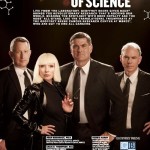The distinction is not trivial. I have been thinking about this alot over the last couple years while reflecting on my goals and how I can best communicate the exciting research that I and my colleagues are doing. There are different roles for each category and both persons have important, exclusive responsibilities. Science communication is a personally rewarding endeavor. Miriam, Dr. M, and I gladly (and without pay!) blog on topics we find interesting. Currently we are all scientists who attempt to be communicators as well. I think I can say that neither of us have this in our job description, yet we feel compelled to set an example as young scientists who believe that their research means nothing if it is not appreciated, or at least known, to the public whom we owe our continued support to in many cases.
I view the role of a science communicator as a purveyor of the discoveries, implications, predictions and controversies that scientists, and the scientific process, yields. They are typically concerned with the craft of writing and the art of storytelling. Science communicators have access to major media outlets, make a great attempt to reach the broadest audience possible and, with notable exception, reach a much larger number of interested and potentially interested readers. It is often their sole job to communicate science.
On the other hand, scientist communicators often aspire to communicate on par with science communicators but have limited resources (namely time) to devote to such activities except in the rare circumstances where it is part of a scientist’s job description. The desire to communicate the discovery, excitement, and implications of research effectively is matched by a plethora of responsibilities such as teaching, securing more funding for research and students, committee duties, mentorship, lab or field work. Oftentimes, communication is done on one’s own time with some amount of recourse from supervisory staff (i.e. the old guard who live in an outdated career model).
A scientist communicator offers a unique point of view and personal history that a science communicator cannot offer an audience. The in depth knowledge of their system and details of field observations, experiments, conversations with colleagues and an extraordinary breadth of literature gives the scientist a pool of knowledge to draw from that often is unmatched by most science communicators. This also has a drawback. Scientist’s often know so much it is very difficult to winnow information and discoveries into a form that is recognizable by your typical “Joe the Plumber”.
Sometimes though, people want to hear about science from the horse’s mouth. This is why scientists are asked to interviews by the media, specifically radio and TV. Some scientists are very good at discussing science with an interviewer. They are elegant in their information translation, responsive to the interviewer, well-composed and able to think quickly on their feet. Many are not and appear annoyed or uncomfortable, stumble over their words, interject rehearsed soundbites in lieu of preparedness to be interviewed and fail to personalize research and the field of science as a whole.
So why not substitute the science communicator in place of the scientist during these moments? This is essentially what happens in newspapers, magazines, websites and press offices. The science communicator is often thought of as the translator, someone with a well-practiced grasp of language and grammar, and who is smart enough to not only understand the concepts and write about them for a lay audience, but also to ask the right questions to be able to get the most information out of the scientist. It would seem reasonable that interviewers should talk with science communicators instead scientists. As I discussed above though, people like to hear the information from the originator instead of a middleman. They want their discoveries full proof, straight-laced without any preservatives or additives.
But, there is another, possibly more important role for the scientist communicator that a science communicator cannot provide. It is a calling beyond the role of communicating their life’s work to the public. It is as a role to provide a career model for other up-and-coming scientists. To say it is OK to talk about this stuff. Go ahead and blog on some neat paper. Engage the public in scientific discourse, view it as a learning experience for the both of you. Give public lectures about your research. IT IS ACCEPTABLE TO BE EXCITED BY SCIENCE AND TALK ABOUT IT OPENLY. Many students and staff do not have this role model. The traditional, outdated model of a career in science stifles enthusiasm. That very enthusiasm that made you interested in science to begin with!
The public feeds off of enthusiasm. If you are studying a neat system and tell everyone you know what cool things you study, important questions you are answering or strange creatures that you found then YOU ARE DOING OUTREACH. And its OK. I’ve done some of my best science outreach at the local pubs or airport bars during layovers just talking to the people around me. But scientists that are excited about their work sometimes suffer from over-enthusiasm too. IT IS NOT ALL ABOUT US! Do not lose sight of what a discussion is: a two- (or more) way conversation. Scientists need to be better listeners. Our traditional mode of communication is the lecture. We stand on our soap box and command the world’s attention. Well “Joe the Plumber” has something to say too and it is just as important as what we have to say.
In fact, what “Joe the Plumber” has to say is more important than our research or enthusiasm. The words coming out of his mouth during a conversation can be more informative than our many years of working on one of the most important problems in basic science. “Joe the Plumber” has the ability to let us know how well we are communicating and how well we can cross ideological boundaries. Not only us as scientists but the entire field of science. All you have to do is listen. Stand down off your soap box, grab a beer, look him in the eyes and listen to what he has to say. Show Joe that you are real person, with compassion and an interest in the very person who indirectly funds your research with his working-wage sweaty, grimy job pulling hairballs out of your shower drain. Ask him questions about his work and life too. SHOW AN INTEREST IN PEOPLE. One of the best ways to be a scientist communicator may indeed be by not being “such a scientist” as Randy Olson would pontificate (review of his book forthcoming).
Most other professions realized this long ago, but a member of a group is a representative of that group, whether they want to be or not. We as scientists are all communicators whether we want to be or not. It isn’t even a question of merely abstaining from communication. You are still a role model to your colleagues or students. If you don’t like it, sorry, do your best to stay away from the camera and journalists because now, more than ever, we need people to talk about science and make discussing it openly in the barroom or with the average “Joe the Plumber” the norm. The science communicator has a very important role in this by popularizing science, but only the scientist communicator can be a role model to other scientists and show the public that we are human and care about what they have to say.






See also, The scientist and blogging
Interesting stuff Kevin. I’ve been thinking a lot about this recently after participating in a seminar on public engagement. I am also desperate to move away from the science communicator model. We have a great formula here at the NHM London; a whole group of “science facilitators”. These are people who are trained in science communication and they work with the scientists to help us engage with the public by setting up events and giving us tips. A lot of the time an interview format works well where the audience can jump as questions pop up but they do lots of different events. These guys do a great job and sort out a lot of the time consuming parts of being a “scientist communicator”.
This will take a big step up the ladder of importance in the UK as funding bodies will soon require evidence of wider impact (i.e outside of science), so public engagement will be key. Bring on the era of scientist communicator!
OK first, let me agree: It would be great if scientists speaking to the public (via the press or directly) would show their enthusiasm about their work. I think that would do a lot toward demystifying what they do for laypeople.
But then let me disagree. Science communicators are not and should not generally be interview subjects for any member of the press. They become subjects when discoursing on their area of study (e.g. Miriam and marine debris), but then they become scientist communicators, your first category. But no journalist goes looking for a communicator who isn’t an expert in the subject of the story. Being able to write well is no substitute for actual knowledge when it comes to being a source for the journalist. The people who are often designated as communicators often can’t answer questions on a subject past a certain superficial level. The science communicator never replaces the scientist communicator (not in newspapers, magazines, OR websites). They replace the journalist. Carl Zimmer is a fine example of a science communicator, as are you, as is Miriam. You’re all science journalists. Welcome to the club!
But I doubt any journalist would call any of you as an interview subject outside your areas of scientific expertise (unless for a story on science communication, another of your areas of expertise). Well, maybe to provide some broader context for why a discovery is important within a field, or to provide other sources for interviewing. But never to replace the scientist. That would be crappy journalism.
Anyway, while it’s great for scientists to become communicators, I’m not sure it’s as pivotal as you seem to think. Not all scientists are good communicators, partly because many don’t want to be. They want to do research. As long as these scientists keep their doors open at least a crack to answer questions from inquiring minds, I think that’s enough. Let scientists do science, let writers write. The Internet has created wonderful new avenues for science journalism, and a whole new crop of wonderful science journalists. If other people have other interests, why force them out into a world they don’t want to inhabit?
Hi Nick, thanks for your comment! The science facilitator model sounds interesting. Do they typically have science backgrounds or communications backgrounds?
Our NSF grant also include a broader impacts statement. Some professors sort gloss over it and say they will do something, but don’t really fulfill it in any meaningful way. I’ve been lucky to work with professors who take it seriously.
You bring up some good points. Some of us bridge the divide: subject matter experts whose professional duties include communication.
I think communicating to non-scientists is important for all scientists to do at some level. My undergrad advisor used to say that if you can’t explain your work to a non-scientist, then you don’t fully understand it yourself. It’s a good exercise, because it requires dropping jargon and focusing on meaning. But, more importantly, science can’t happen in a vacuum: communicating about science to the general public increases the likelihood that people will support public funding on the issue. It also serves to increase science literacy, thereby enabling people to better evaluate the (mis)information with which they are bombarded on a daily basis.
Hi Kevin. Many of them will have done science at undergraduate level but they are all trained in communications. We now have a show put together that I do and it takes no time at all. The great thing about doing this as an early career scientist is getting to talk to people who are just thinking about college because it wasn’t too long ago that I was in their shoes.
Though this all pales in comparison to the great effort that you guys put into DSN. Keep it up!